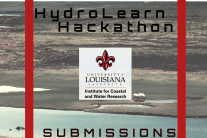On Friday, April 4th, the University of Louisiana at Lafayette hosted its Annual NSF EPSCoR Project Meeting for the
HydroLearn TM (Summer 2020) Hackathon Videos Now Available
Fri, 08/21/2020 - 5:06pmThe HydroLearn TM project hosted a two-week virtual hackathon for hydrology and water resources instructors to participate in the development of online learning resources that can serve the larger community. Following a “hackathon” approach, the workshop brought together more than 30 faculty members from 28 universities across the US and one international institution. During the hackathon, the participants collaborated remotely and co-created educational resources that support the increased focus on online teaching, but can also serve the transition back to in-class learning by harnessing ongoing efforts to develop effective digital teaching resources. The workshop included training on the development of resources using research-based pedagogical approaches. The hackathon resulted in the development of a total of 14 modules co-developed collaboratively by groups of 2-3 participants.
Learn more about the Virtual Hackathon by viewing the daily sessions.
Thank you all for participating!
Below are links to the submission videos:
- Intelligent Earth Computational and Data Science Methods for Research submitted by Dr. Christina Bandaragoda, University of Washington and Dr. Tao Wen, Syracuse University
- Remote Sensing Applications in Hydrology submitted by Dr. Viviana Maggioni, George Mason University, VA and Dr. Manuela Girotto, University of California, Berkeley.
- Fluid Mechanics: Bernoulli's Equation submitted by Dr. Mauricio Arias, University of South Florida and Dr. William Gonwa, Milwaukee School of Engineering.
- Evapotranspiration submitted by Dr. Jo Archibald, Humboldt State University, Dr. Hugo Gutierrez, The University of Texas at El Paso, and Dr. Shangping Xu, University of Wisconsin Milwaukee.
- Rational Methods to PCSWMM: Matching Models to Situations submitted by Dr. Gianna Cothren, University of New Orleans and Dr. David Spelman, Bradley University.
- StorAge Selection (SAS) and mesa.py: A gentle introduction submitted by Dr. Ciaran Harman, Johns Hopkins.
- Stream Solute Tracers submitted by Dr. Adam Ward, Indiana University.
- Groundwater Flow submitted by Dr. Erin Haacker, University of Nebraska - Lincoln and Dr. Mira Olson, Drexel University
- Hydrologic Droughts and Drying Rivers submitted by Dr. Hillary McMillan, San Diego State University and Dr. Joann Mossa, University of Florida.
- Aquifer Characterization: Case Study from Snake Valley submitted by Dr. Alex Beebe, University of South Alabama and Dr. Mark Hausner, Desert Research Institute, Reno, NV.
- Hydrologic Design in PCSWMM submitted by Dr. Zuhdi Aljobeh, University of Nebraska-Lincoln, Dr. Courtney Di Vittorio, Drexel University and Damien Di Vittorio, Drexel University.
- Water Planning for Sustainability submitted by Dr. Freddi Bruschke, CSU Fullerton and Dr. Sam Sandoval-Solis, University of California, Davis.
- Snow Hydrology 101 submitted by Dr. David Chandler, Syracuse University and Dr. Josh Roundy, University of Kansas.
- Introduction to Floodplain Analysis submitted by Dr. Austin Polebitski, University of Wisconsin Platteville and Dr. Tyler Smith, Clarkson University, KY.

